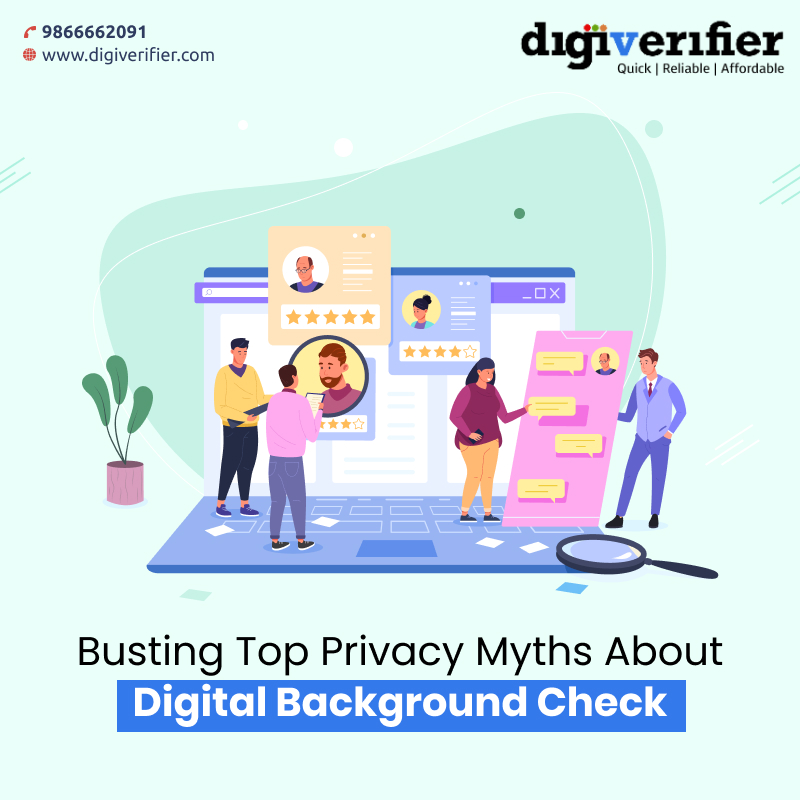Debunking the Privacy Myths of Digital Background Verification
 January 10th, 2024
January 10th, 2024
Concerns regarding privacy have grown in the fast-paced digital age where information is shared instantly, particularly when it comes to hiring procedures. Employers can use digital background verification, a potent tool to help them make knowledgeable hiring decisions. However false beliefs about privacy frequently prevent businesses and people from embracing this game-changing approach and utilise its full potential. We hope to dispel the misconceptions about Digital BGV’s privacy in this blog and highlight how it helps to create a safe and effective employment environment.

Understanding Digital Background Verification
Digital background verification entails using technology to authenticate and confirm a candidate’s background in a number of areas, such as employment history, education, criminal history, and more. The procedure is simplified, effective, and reduces the possibility of human error. However as more businesses use this approach, worries regarding the privacy of personal data have emerged. Let’s talk about these issues and dispel the myths.
Myth 1: Digital Background Verification Invades Personal Privacy
Fact:
Relevant professional data is heavily emphasized on, in the design of Digital BGV. It avoids talking about personal issues unrelated to the current task. The process conforms to legal and industry standards to ensure that only pertinent data is accessed and validated. Respecting each individual’s right to privacy, digital BGV aims to strike a balance between gathering the necessary data and preserving individual privacy.
Myth 2: Digital BGV Puts Sensitive Information at Risk
Fact:
Reputable background check services place a high priority on data security, debunking the fallacy that digital BGV leaves private data vulnerable to hackers. By employing state-of-the-art encryption methods and abiding by data protection regulations, these platforms shield the data from unwanted access. Integrating secure technologies actually improves the protection of sensitive data during the verification process.
Myth 3: Digital BGV Lacks Transparency
Fact:
During the open digital BGV process, candidates can observe the data being verified. It ensures that only relevant information is considered and makes the scope of the verification clear to users. Digital BGV’s dedication to openness promotes a positive recruiting experience by building trust between employers and candidates.
Myth 4: Candidates Have No Control Over Their Information
Fact:
The fact that candidates have no control over the information accessed during Digital BGV is one common worry. In actuality, candidates participate actively in the selection process. They give permission for the verification, and trustworthy platforms notify candidates at every stage of the procedure. Transparency and cooperation between hiring companies and candidates are essential components of ethical digital BGV.
The Benefits of Digital Background Verification
Now that we’ve dispelled some common privacy myths, let’s explore the benefits of embracing digital BGV for both employers and candidates:
Efficiency
- When comparing digital BGV to traditional methods, the time needed for background verification is greatly decreased.
- Employers can make quicker, more informed decisions by automating the verification process, which streamlines the hiring process.
- Using digital platforms shortens wait times and speeds up the hiring process by enabling quicker data processing and retrieval.
Accuracy
- Human error in the verification process is reduced by automation in digital BGV.
- Digital tools and algorithms are made to adhere to predetermined standards, guaranteeing a uniform and standardized method of conducting background checks.
- Employers get dependable data for decision-making since automated processes improve the accuracy of the information gathered.
Compliance
- Respect for legal requirements and data protection laws is a top priority for reputable digital BGV platforms.
- These platforms are made to abide by privacy laws and regulations, guaranteeing that the background check procedure is carried out lawfully and morally.
- Employers are less likely to face legal issues because they can trust that the data acquired via digital BGV is legitimate.
Enhanced Security
- To safeguard sensitive data during the verification process, Digital BGV uses cutting-edge encryption and secure technologies.
- To reduce the risk of data breaches, secure transmission and storage methods are used to protect private and sensitive information.
- By establishing a secure environment for handling sensitive information, the increased security measures help to foster trust between employers, candidates, and the digital BGV platform.
Transparency
- Candidates are frequently given real-time updates on the status of their background checks by digital BGV platforms.
- Transparency and trust are fostered by informing candidates at every turn.
- The hiring process is more transparent and trustworthy since candidates have a better experience with the verification process.
Conclusion
Digital background verification is a dependable and effective way to verify someone’s background when applying for jobs, where privacy and trust are crucial. Organizations can take advantage of digital BGV’s benefits and make educated hiring decisions while upholding candidates’ right to privacy by debunking the privacy myths surrounding it. Building a safe and reliable hiring environment requires knowing and utilizing the capabilities of digital BGV as the digital landscape changes further. If you are looking for the best vendor providing these services, then you can get in touch with Digiverifier.
